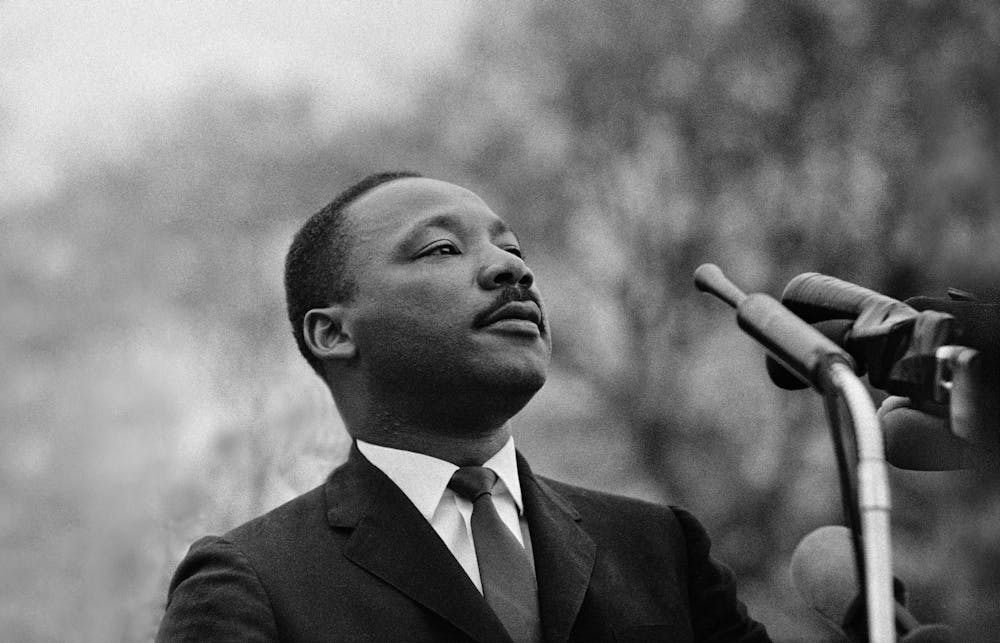It’s impossible to have a conversation about social justice without referencing the famous Reverend Dr. Martin Luther King, Jr. Arguably the most notable civil rights leader in American history, he is often used when invoking ethos in arguments for both provocative societal change and the importance of civil disobedience over violence in calls to action. The name MLK is synonymous with civic engagement, so much so that this year’s Penn Reading Project focused around that very topic and included a piece by Dr. King, “The Purpose of Education,” which he wrote while in college.
King’s call for the restructuring of prejudiced political, social, and economic hierarchies was echoed internationally. This contributed to the civil rights movement of the 1950s and ’60s in the United States. His part in this movement won him the Nobel Peace Prize at 35. His prioritization of discourse, civil disobedience, and community was inextricably linked to the success of the movement. Nevertheless, what King “really” stood for is often a contentious question: was he a pacifist, the leader of a radical movement, or both?
Movements like Black Lives Matter and their supporters have claimed that Martin Luther King’s legacy has been “whitewashed” or otherwise selectively praised by the country. His “Letter from Birmingham Jail” is often quoted to substantiate the argument that King believed violence was necessary and warranted to incite change. His quote, “A riot is the language of the unheard,” was projected by social justice advocates all summer as evidence to support the devolution of largely peaceful protests into riots.
Dr. Mary Frances Berry, Penn history professor, a close friend of the King family, and author of “History Teaches Us to Resist” expressed the importance of King’s message today when I asked her about the activist’s legacy. She explained, “Inequality remains and the struggle continues. Jobs, justice, and an end to police abuse are still issues now as they were in the 1960s and before.” Nevertheless, she also cited that any effort to try to paint Dr. King as anything but peaceful is misleading, saying that “he unequivocally believed in non-violent protest.”
This sentiment is shared by many who argue that the pinnacle of Dr. King’s advocacy was his calls for nonviolence and have chided BLM and other activist groups for saying differently. The word “nonviolent” is actually present within King’s “Letter from Birmingham Jail” over 15 times. Dr. King is also frequently described as being in opposition to fellow civil rights leader Malcolm X, for their different visions of how to attain racial equality in the United States, King’s being significantly less violent.
John Capehart, a Black columnist for the Washington Post argues against the claim that King "deliberately courted violence" in a 2015 editorial, “A cynical view of MLK, Black Lives Matter and violence.” In his piece he quotes Clarence B. Jones, lawyer and close advisor to King, who said on the issue, “What was critical to the success of the 1960’s civil rights movement was the ability of Dr. King to awaken the conscience of white America to the immorality of racial segregation," claiming that saying King “invited” violence is “turning history on its head."
While this is true, it would be equally unfair to diminish Dr. King’s legacy to that of simply a “dreamer” whose passivism appealed to white America. He was arrested nearly 30 times for his acts of civil disobedience, for breaking laws that he deemed unjust. He helped lead nearly a quarter-million people in the 1963 March on Washington. King was eventually assassinated for the vehemence of his pursuits a five years later.
One of only a few people to have their birthday memorialized as a U.S. national holiday, Martin Luther King Jr. is a figure in American history as notable as the founding fathers. He was also a deeply religious man — a Baptist clergyman like his father, King’s views were shaped largely by his Christianity. A notable critic of capitalism, he also held strong Christian social values. His complex legacy is upheld by his descendants, particularly his niece Alveda King, a prominent figure in the religious-right movement, and his son Martin Luther King III, a notable human rights advocate.
All of this is to say that in order to fully appreciate King’s legacy and influence, we need to treat him like the individual he is and not a two-dimensional symbol of selective rhetoric. While Dr. Martin Luther King Jr. “unequivocally believed in non-violent protest,” he was also, in his own words, a man of “direct action.” As we further grapple with the issue of race in 2021, rather than idealize his most convenient version in a political argument, let’s be the civically engaged citizens he called for.
LEXI BOCCUZZI is a College first-year studying philosophy, politics, and economics from Stamford, CT. Her email is abb628@sas.upenn.edu.









